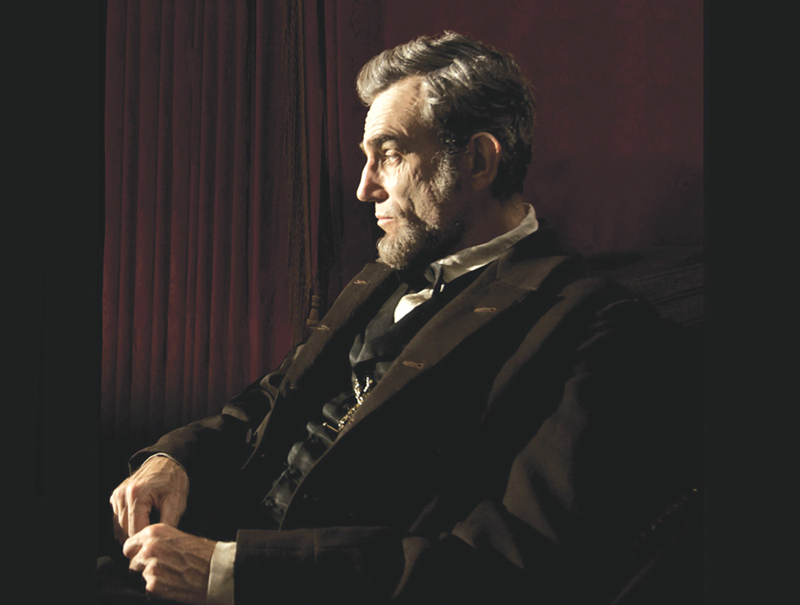Right off the bat in Lincoln, director Steven Spielberg gives us one of his signature moments, a framing device in the story that is supposed to be based on historic facts that smacks of pure invention and threatens to derail our investment in, not just the individual moment, but the film as a whole. Here, Lincoln (Daniel Day-Lewis) sits under an open tent speaking with a pair of black Union soldiers, Private Harold Green (Colman Domingo) and Corporal Ira Clark (David Oyelowo). Green agreeably chats with the president, but Clark presses his commander-in-chief at every turn for some sense of future opportunity, not just for himself, but for what he imagines will be the newly freed population of slaves eager to prove themselves in the new world order. If they sacrifice and fight like everyone else, why not enjoy the spoils of that effort? These three are soon joined by two young white soldiers (Lukas Haas and Dane DeHaan) who attempt to recite bits of the Gettysburg Address like schoolboys intent on impressing a favorite teacher. The soldiers are called to join their regiments, but it is Clark who finishes the quote, as a reminder to Lincoln of his obligation to the slaves and the whole nation.
It is a ham-fisted bit of hokum, obvious and overly righteous as a Sunday sermon, but instead of reverberating off empty pews, the moment lingers and sets the stage for what is to come. It works because it builds off our assumptions about the iconic thoughtfulness of Lincoln. To most of us, he is little more than a face in the history books, hard-aged with that signature beard, and the orator whose speeches continue to marvel and astound us, especially in an age when our politicians, even the most eloquent, address us from teleprompters with phrases culled and crafted by teams of writers and staffers who will go on to write books, host cable opinion shows and maybe pursue their own small-minded political aspirations.
Lincoln was not merely from a different age; he was a different kind of man and Day-Lewis seems to capture both the man and the icon in every frame. Right from the start, with those seemingly focus group-tested pairs of soldiers, Day-Lewis allows us to see Lincoln truly listening to the men and their concerns. He is totally present in the moment, but he is also busy inside his head. He inherently appreciates that this moment will have great meaning to him at some point down the road and he is gathering the necessary details that he will need to draw upon. He’s a great thinker and planner, but he’s also a folksy storyteller with all the accumulated wisdom at his disposal to boot. Not only that, Lincoln cracks himself up with the stories and his telling of them, which confounds and confuses friends and foes alike.
Lincoln, Spielberg’s film, which is based on Team of Rivals by historian Doris Kearns Goodwin (with a script by Tony Kushner), is a talkative yarn about the 16th president’s efforts to get the 13th Amendment passed before negotiating the end of the Civil War. This is a huge political gamble because so much of what Lincoln has already attempted to accomplish — the Emancipation Proclamation and the war — has been predicated on precarious legal foundations and the presumptiveness of war powers that have been untested in the still fledgling union of states. He hopes to present strength, the strength of the nation behind him, despite the fact that the nation itself is obviously divided and likely not exactly behind him on the major issue of the day.
We watch and it is nearly impossible to not make comparisons to present-day political situations, but what Spielberg gives us is actually a warty proposition. Lincoln and his Secretary of State William Seward (David Strathairn) cast a wide net to gain the necessary votes to pass the amendment, using any and every means available to them. They offer key appointments to outgoing opponents, the occasional bribe and browbeat the weak-willed. Lincoln steers clear of the most sundry aspects of the details, but he keeps abreast of the players and the game.
As the film progresses, we are more than able to keep track of the comings and goings as well, but what matters is the man and Day-Lewis navigates the tricky performance needle-threading as only he can. He is quiet, the polar opposite of Daniel Plainview (There Will Be Blood) or Bill the Butcher (Gangs of New York), but no less in charge of the proceedings. More than that though, his Lincoln is a bigger and better man (human) than the admirably well-intentioned film that surrounds him.
Opens wide Friday. (PG-13)
Grade:
B+
CONTACT TT STERN-ENZI : [email protected]


